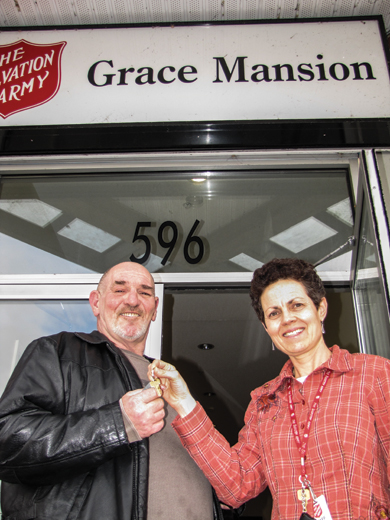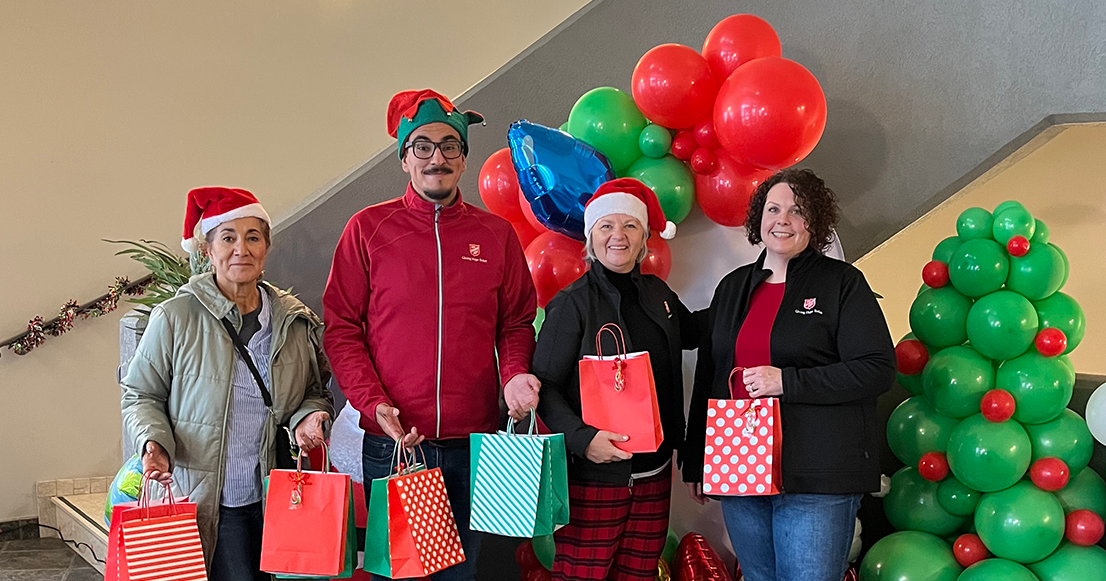
Without Grace Mansion, I'd be dead in some back alley over there,” says Grace Edge, motioning down the street to Vancouver's Downtown Eastside. “The Salvation Army and Grace Mansion saved my life.”
Filling a Need
In 2006, The Salvation Army purchased an underused seniors' facility to provide housing and support services for Vancouver's at-risk and homeless population. Six months later, it reopened as Grace Mansion.
The four-storey building has 84 units and, at any point in time, about 80 residents. Referrals come from other Salvation Army facilities, such as Belkin House and Harbour Light, as well as non-Army treatment centres in and around Vancouver.
“We get self-referrals too,” says Major Don Grad, executive director. “People living in cockroach-infested hotels think there's got to be something better, and they're probably struggling with addiction issues. About 70 percent of those living at Grace Mansion have some sort of addiction background.”
Grace Mansion is wheelchair-accessible with communal space and an open-air patio on the second floor, where barbecues are held in the summer for staff and clients.
“The staff manning the front entrance address clients by name and they ask them how they are doing,” says Major Grad. “We want our interactions to be happy and supportive. Many of our clients are only learning here how to have a normal conversation again.”
“When you're in an environment where people are kind, thoughtful and caring, it makes you peer into yourself a little deeper,” reflects Robert Harris. He came to Grace Mansion with eye problems that necessitated a cornea transplant, which the staff at Grace Mansion helped facilitate. Where he had been almost blind in his right eye, he now has almost complete vision in it. “I wake up with a purpose in life, in a clean safe place that I am proud to live in.”
“All of our apartment units basically look the same,” Major Grad continues. “It's roughly equivalent to a bachelor suite: kitchen, fridge, stove, bathroom and shower.”
A tour of the various floors proves his point. The apartments are bright and cheery and could easily pass as condos, especially so close to trendy Gastown.
In a city with little affordable housing, people with the lowest social incomes and the least social support face the risk of homelessness. Perched on the border of the Downtown Eastside, Grace Mansion answers an important need.
“We don't provide food,” continues Major Grad. “The residents do their own cooking. Basically, it is independent living with one important proviso: everyone that comes here has to be on their own personal development plan program.”
Grace Period
The Personal Development Plan (PDP) is at the core of all that Grace Mansion does.
“We wanted to provide an intermediate step between treatment and living independently,” says Tara Ayers, Grace Mansion's director of residential services, “so our PDP program is structured around goal setting and how we can help our clients make changes that are effective and lasting in their lives.”
Grace Mansion's objective is to look at the individual, help that person identify what needs to be changed in their life and then give that person the resources needed to do that.
“We believe that what's missing for our clients is setting goals—reasonable goals—and achieving them,” Ayers explains. “They're not going to own a house and a business in two years. We try to help them set measurable goals.”
Starting with the first intake session, residents are asked questions such as: “Where do you see yourself in two years? What do you want to achieve while you're here?” A residential support worker is then assigned who meets with each client at least once a month, using a PDP worksheet to monitor progress.
Major Grad recalls one client who purposefully taped four goals to his refrigerator: go to school; get a job; get a driver's licence; get a car.
“And he did it!” smiles Major Grad. “He achieved the first three while he was here and obtained a car a month or two after he left.”
In this client's case, he was able to stay a few months past the maximum 24-month period that residents are allowed.
Body and Soul
Grace Mansion's flexibility stood Norman Daryl Milne in good stead. An addict who came to Grace Mansion after spending a year at Harbour Light, he needed to undergo hepatitis C treatments that he found hard to handle, so he was allowed to remain during his treatment regimen.
“It's like a stepping stone for me here,” Milne says. “Once I leave, I'll be leaving the downtown area, where I spent the last 35 years of my life.
“I have a lot of gratitude for The Salvation Army and Grace Mansion,” he continues. “It changed my life. I'm no longer an addict, I have a place to stay and people here care. They've given me a chance to go ahead with my life.”
“We've given Daryl a stable place where he can live clean while he attends to his medical recovery,” says Major Grad. “He's also working on his spiritual recovery and we'll be there for him, too.”
The spiritual aspect of Grace Mansion is always a factor in the growth of the clients.
“I don't know if it's so much a sense of our clients coming to faith for the first time,” says Major Grad, “but for many it's been a renewing or reviving of a faith that perhaps had been dormant for too many years to count.”
Grace Edge found her faith at Grace Mansion and it changed her forever. She now attends evening Bible study sessions and volunteers at the facility, something that she intends to do even after she leaves.
“Everything in me has to be clean,” she smiles. “My mind, body and soul.”
This past December, Edge celebrated her first sober Christmas in 30 years. As part of the celebration, her younger brother visited her at Grace Mansion.
“That was the biggest day ever,” she says, beaming. “I hadn't seen my little brother in over 20 years. Before, I had been either working the streets or drugged up somewhere. Now, I'm clean and I'm in a great place.”
“They Care”
This spring, Edge moved out of Grace Mansion into her own apartment.
“This is the first time that I'll be on my own without drugs, without alcohol,” she says. “This is me going off as an adult, moving forward into the future.”
That future includes moving home to Surrey, B.C., where she hopes to eventually become an official member of The Salvation Army. Arrangements have been made for a corps there to contact her when she relocates.
“That means they care about me, even when I am no longer with them,” marvels Edge. “When I came to Grace Mansion, I was scared. I didn't think I could make it. But here I am, on my own. I like who I am today.”









Leave a Comment